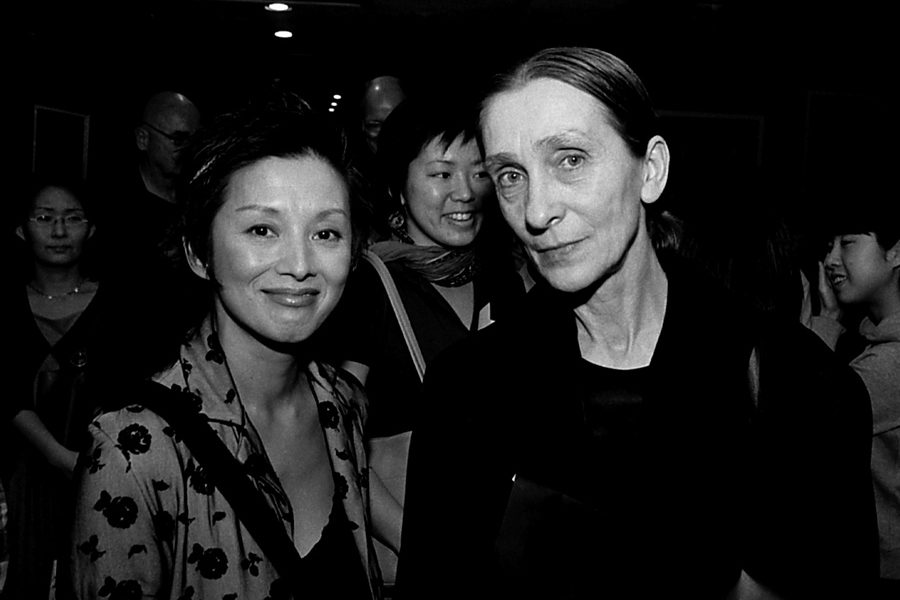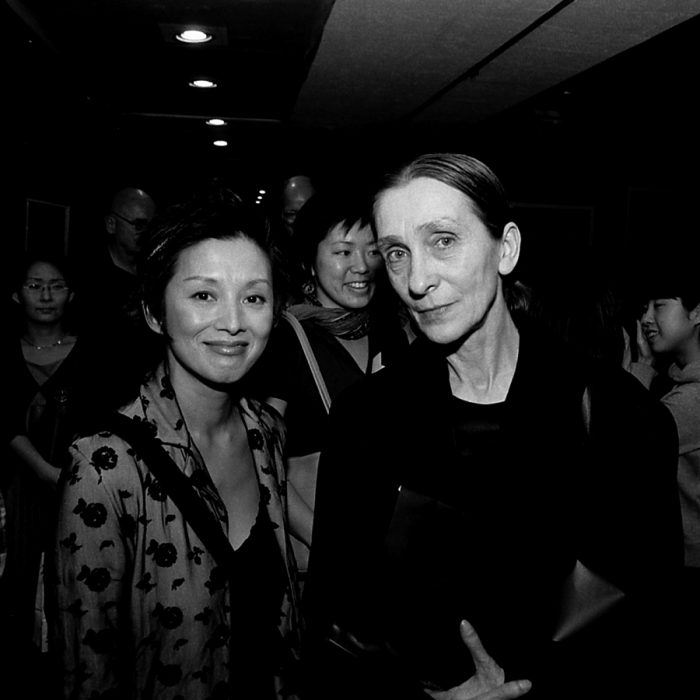
Others: Player, Actress, Singer Natsuki Mari
Judit Kawaguchi talks to player Natsuki Mari
The great movie narrator, benshi Midori Sawato compares Mari to some of the big screen’s greatest stars. “She has an honesty about her performances that transcends all borders of nationality, race, age, place and media. One moment she is a little child, next an old person, she is a man, a woman, all. She is an artist in the very deep sense of the word. Her dimension is very different from anyone I have seen, especially on the Japanese stage where cute is the operative word for success. “
Yes, in Japan where Kitty chan rules, Mari is a definite enigma. Her favorite actress is Jeanne Moreau, her role model is Pina Bausch and she loves Kurt Weil’s songs. Sawato continues: “ In her shows one moment we can smell and feel the decadence of 1930’s Berlin but the next second we are in the present, in Tokyo. Her metamorphosis is mind-boggling and impossible to describe in words. I guess she can not talk about it all and that is why she stages these amazing performances. “
Natsuki Mari is a magician: she tricks us into believing that we got it all the first time. She stands with her back toward the audience and even before uttering the words, “can’t understand it,” we know she doesn’t.
This is theatre as Brecht envisioned it, a place where we go to be part of a larger dialogue.
Eugene Ionesco and Samuel Beckett would have written plays for her, were they alive and living in Tokyo. No wonder we rarely see her on Japanese TV. She doesn’t belong there:she is too heavy for the general fluff most TV shows offer up as entertainment. How did she get here?
“My dad was a regular salaried worker who loved music so our home was always filled with the classics so I thought I would be a music teacher later on. I had the usual dreams of my generation; getting married and living a simple life. I was a very shy kid, unable to express my feelings: I was pretty unbalanced.”
Born in Tokyo in 1952, she pursued singing after high school against her family’s wishes and released two albums under her real name, Junko Nakajima. Both were flops and she gave herself one more chance. “It was June and I figured by the end of summer I should decide if I continued or not so I called myself Mari Natsuki ( natsu means ‘summer’ and kimari means ‘to decide’ )”
In 1973 she became an instant national sensation with her sexy rendition of “Silk Stockings” but soon a serious bout of acute anemia kept her off the TV screens just long enough to be dropped from the Japanese media. Her more notorious side was formed performing in smoky, dingy joints traveling around Japan as a struggling cabaret singer.
“This went on for 8 years, almost till I was 30 and it was an awful struggle emotionally. The money was good but my life wasn’t. I was utterly miserable and wondered if that was all there was to life”
Luckily for us, it was not. A Deus ex machina appeared and she was offered a role in a musical. She shined and other offers followed, setting in motion her career as a leading actress. “When I sang, I felt comfortable but in the theater I suddenly realized I didn’t know anything about dancing, singing or the stage. I lost my confidence and developed all kinds of complexes. I wanted to get better at my craft so I started training.”
She did non-stop for the next 10 years while she acted in plays and films and also released albums. She was a star and had it all but she felt the need for another change. “I was tired of being told to stand there, say this, do that. Japan is a hierarchical society and the system is the same in the arts, too, with the director in the teacher’s position and actors are nothing but students. He tells them what to do and there is really no time for any discussion. I wanted more time to think about my work with many different people.”
In 1993 she wrote, directed and staged her first Impressionist show and she is preparing for her 8th scheduled for 2006, October. She traveled with her shows to many countries and on the net there are sites dedicated to her in Polish, French and Russian. “I love performing abroad because the audiences are mature and honest. If they don’t like the show, they get up and go home and if they love it, I get a standing ovation. I became a stronger person and performer thanks to such audiences. “
Natsuki is constantly busy with other projects. She is on TV, and hosts theater workshops where participants’ ideas are respected and debates are encouraged. Earlier in 2005, she released a beautiful album entitled Sensou wa owatta, (The War Is Over). All this comes hot on the heels of her fantastic performance in 2001 as the voice of Yubaba in Hayao Miyazaki’s animation, Spirited Away.
In her 2004 book, Kakkoii Onna (Cool Woman) she explains her mission: “I always want to be an intelligent, adult performer and a kind person. I think if I am a kind, nice woman, it will show up on the stage.”
Her ideal collaborators? “Pina Bausch and Robert Wilson, because they are both intelligent and their visuals are great. I would also love to sing Inoue Yosui’s songs.”

(© 2002 by Peter Brune)
Dr. Maya Angelou, the author and poet, said that “When you learn, teach. When you get, give.” Natsuki Mari does it all and all so beautifully. Once the show is over, her spirit lingers—and this certainly translates well into any language!
More at marinatsuki.com.
A version of this article appeared in the June/July 2005 issue of J Select magazine, Vol. 32 No.6
This Quote“I love performing abroad because the audiences are mature and honest. — Natsuki Mari